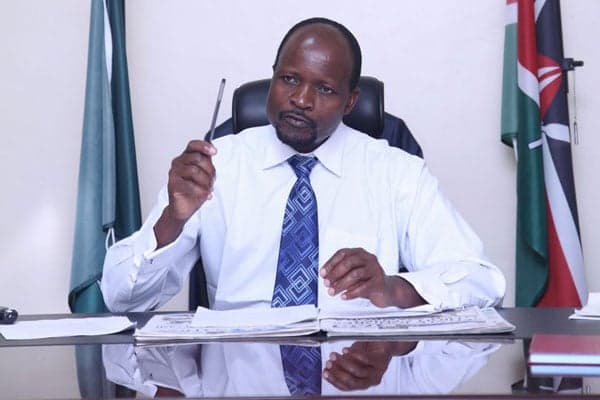We're loading the full news article for you. This includes the article content, images, author information, and related articles.
The Ethics and Anti-Corruption Commission (EACC) is moving ahead with the auction of properties worth about KSh 505 million that were surrendered or forfeited in connection with the graft allegations involving former Migori Governor Okoth Obado and his associates.

Nairobi, Kenya — September 22, 2025, 15:30 EAT.
The Ethics and Anti-Corruption Commission (EACC) is moving ahead with the auction of properties worth about KSh 505 million that were surrendered or forfeited in connection with the graft allegations involving former Migori Governor Okoth Obado and his associates. The assets span Nairobi, Kisumu, and Migori counties.
Ten high-value assets will go under the hammer in auctions scheduled for October 2025 in Nairobi, Kisumu, and Migori.
The properties belong to four individuals: Jared Kwaga, Joram Otieno, Caroline Obwa, and Yuda Otago Ojuki, implicated in alleged corruption between 2013 and 2017.
Some assets are in prime residential and commercial locations, including Greenspan Estate, Loresho Ridge, Suna East/Wasweta, Kisumu’s Lolwe Estate, Riara, and Migori town.
Obado’s administration in Migori has been under scrutiny for alleged misallocation and misappropriation of public funds, involving fraudulent procurement contracts and fictitious supplier arrangements.
Rather than prolonged court battles, the EACC has increasingly used plea bargains or alternative dispute resolution to speed up asset recovery. In this case, some suspects voluntarily surrendered properties under such a deal.
EACC is exercising powers granted by court rulings that declared the implicated properties as proceeds of corruption (i.e., assets illicitly acquired or acquired through proceeds of graft).
The Anti-Corruption and Economic Crimes Act allows for asset seizure, freezing, forfeiture, and public auction of properties determined to be acquired unlawfully. The legal process includes court orders for forfeiture and then using public auction to liquidate these goods. (As applied in prior cases.)
Auction terms: Interested bidders are required to pay a refundable deposit of KSh 500,000 and 10% of the purchase price on the day of the auction; the remaining balance is to be paid within a specified period (60 days in many reports).
EACC (via statements in notices): Asserts that “proceeds of corruption will not be enjoyed by those who plunder public resources,” and that the assets will be restored to the State for public benefit.
Affected parties (Kwaga, Otieno, Obwa, Ojuki): Some of them apparently cooperated through the plea bargain process by surrendering assets. There is no full public record yet of their defence positions in detail.
Public / civil society observers: These auctions are being seen as significant test cases for whether Kenya can effectively recover stolen public assets and deter future corruption. Analysts highlight the importance of transparency (reserve prices, valuation, fairness in auction) to avoid suspicions of favouritism or undervaluation.
|
Item |
Detail |
|---|---|
|
Value of assets to be auctioned |
Approx. KSh 505 million |
|
Number of properties/assets |
Ten |
|
Counties where assets are located |
Nairobi, Kisumu, Migori |
|
Key auctions dates |
October 9 (Nairobi), October 16 (Kisumu) |
|
Deposit to participate |
KSh 500,000 refundable deposit |
|
Payment terms |
10% on auction day, balance within 60 days |
Risk of undervaluation or weak bidding: If reserve prices are too high or the process is poorly publicised, some assets may fail to attract bids or may sell below market value.
Legal or procedural challenges: Even with plead-bargains, there may be legal pushback by some of the implicated individuals or further appeals; oversight will be needed to ensure due process.
Public perceptions and deterrence: The success of this auction (fairness, amount recovered vs expected) could either enhance public trust in anti-corruption institutions or fuel skepticism if seen as symbolic rather than substantive.
Use of recovered funds: How the proceeds will be channelled (health, education, infrastructure) and whether they are absorbed transparently into public budgets is critical for impact.
The specific reserve prices for each property (or how the valuations were conducted).
Whether there will be further legal claims or counterclaims by the former owners beyond the plea deal.
Exact timelines for when the funds from the sales will be allocated to specific public service needs.
Details about how interested bidders can inspect the properties (open viewing, condition, title status).
How this exercise might influence other pending corruption recovery cases.
|
Date |
Event |
|---|---|
|
2013-2017 |
Period alleged for misappropriation of public funds in Migori County under Obado’s governorship. |
|
Recent years |
EACC investigations, asset tracing, and plea bargain negotiations with associates. |
|
September 22, 2025 |
EACC publicly announced the auction of Sh505 million worth of properties. |
|
October 9, 2025 |
Auction set to begin in Nairobi. |
|
October 16, 2025 |
Auction set for Kisumu. |
Whether the auctions proceed smoothly without legal injunctions or last-minute postponements.
Transparency in the process: whether potential bidders and the public are given full details (property condition, titles, reserve prices).
How the funds recovered are used, whether budgets will reflect these inflows in priority sectors.
Reactions from local stakeholders in Migori and affected counties — whether they feel this recovery addresses past harms.
Whether this sets a precedent that strengthens plea bargains and asset recovery in other corruption cases.
Editor’s Note: Based on reporting from multiple Kenyan news outlets (Capital FM, Nation, Eastern Scoop, Kenya Insights). Compiled September 22-23, 2025.
Corrections: None at time of publication.
Keep the conversation in one place—threads here stay linked to the story and in the forums.
Sign in to start a discussion
Start a conversation about this story and keep it linked here.
Other hot threads
E-sports and Gaming Community in Kenya
Active 9 months ago
The Role of Technology in Modern Agriculture (AgriTech)
Active 9 months ago
Popular Recreational Activities Across Counties
Active 9 months ago
Investing in Youth Sports Development Programs
Active 9 months ago